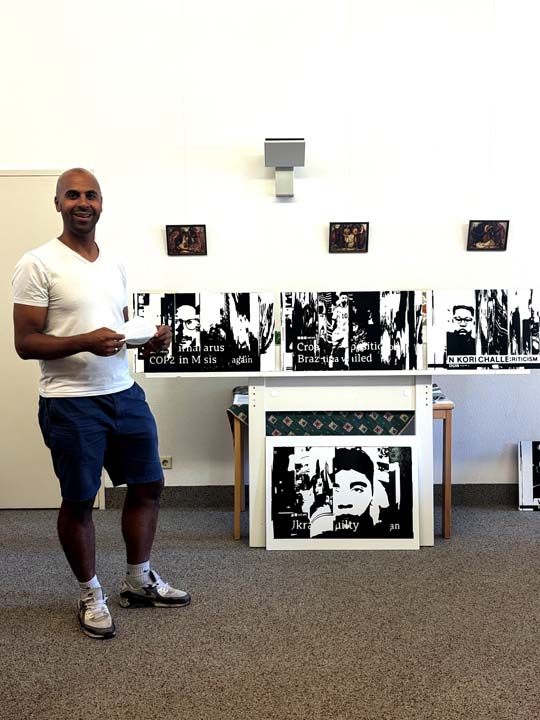
Acrylic on MDF / 40x70cm
Transcription From News Clip:
This is BBC World News, the headlines. There's a top level disagreement in the European Union over the EU's senior jobs. The two big powers in Europe, Germany, and France, have different views over who should be the next president of the European Commission. A series of tornadoes has caused extensive damage in several North American regions. The threat is continuing, the warnings posted in at least half a dozen states from Kansas to New Jersey. A landmark trial linked to the opioid epidemic that is killing nearly a thousand Americans each week has begun in Oklahoma. State authorities are suing a multinational pharmaceutical company, accused of deceit in its marketing of painkillers. The city of Baku is preparing for a major European football final, where the nation's politics are proving problematic for security reasons due to a 30 year conflict between Azerbaidzhan and Armenia, over a breakaway region.
The One Minute World News: Deconstructed and Reconstructed
In a time where news is delivered in relentless, bite-sized bursts, the BBC’s One Minute World News stands as both a personal convenience and a symptom; condensing the complexity of global events into a series of compressed 60 seconds headlines.
This project reflects on how we visually and psychologically absorb such fleeting information.
Using a custom method build from a developing understaing of computr programming – Python, I extract a single vertical column of pixels from each successive frame of a one-minute news video: the first column from the first frame, the second from the second, and so on. Thus building a single composite image that spans the entirety of the video. This becomes a visual trace of time, movement, repetition, and rupture. This image is then translated back in to the real world in the form of paint.
The result is often abstract, sometimes eerily recognisable. Faces may emerge if they linger long enough onscreen (a huge breaking story). Other times, all that remains is a ripple of motion, an image that’s been seen, forgotten, and reassembled.
The viewer is left to question what they’re looking at, much like how we often engage with the news: scanning, half-understanding, then moving on.
As someone living abroad, the BBC remains a tether to a familiar worldview. But in a world increasingly shaped by algorithmic feeds, misinformation, and shifting truths, even familiarity becomes uncertain.
This work doesn’t offer answers it pauses the scroll.
